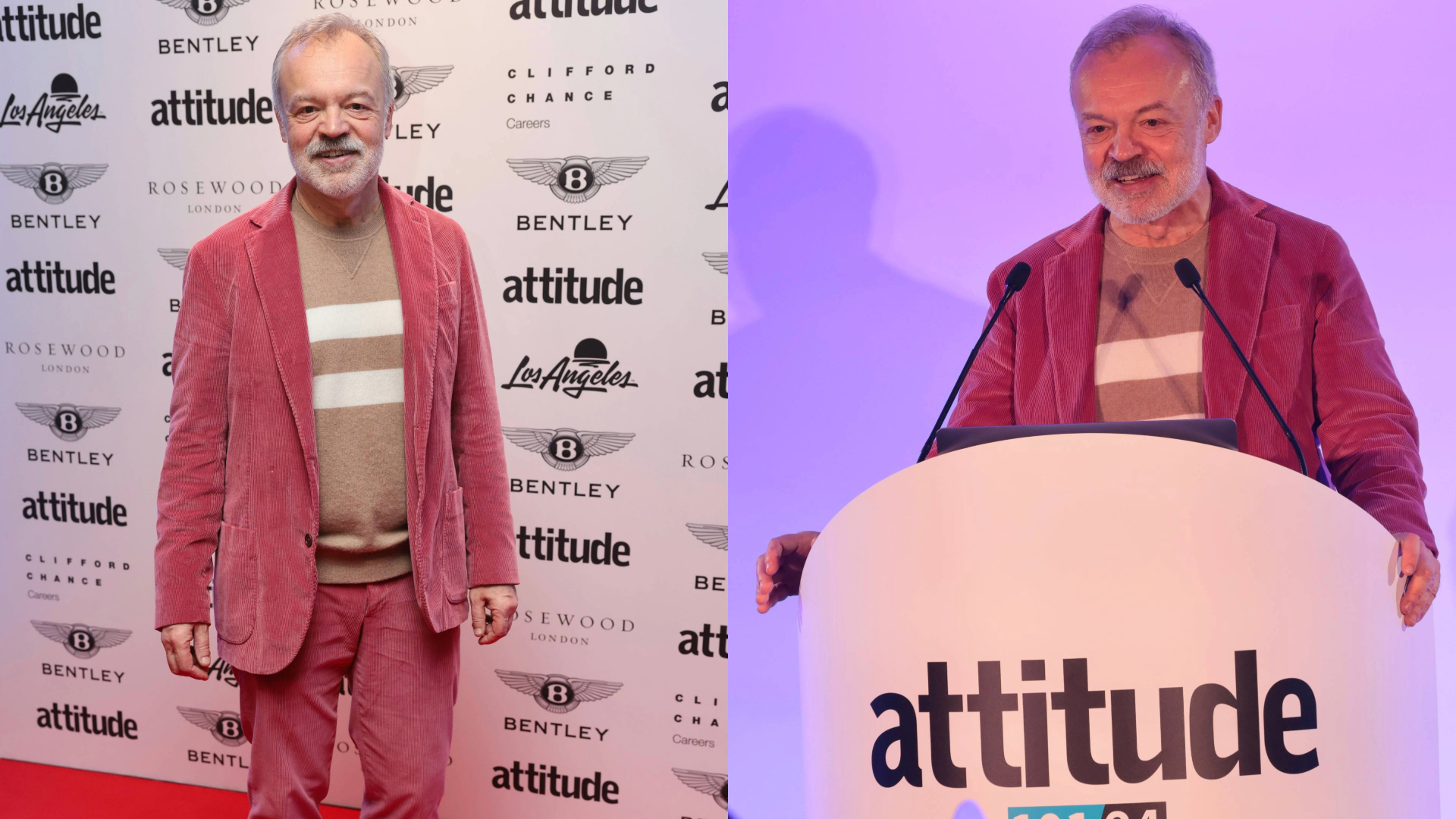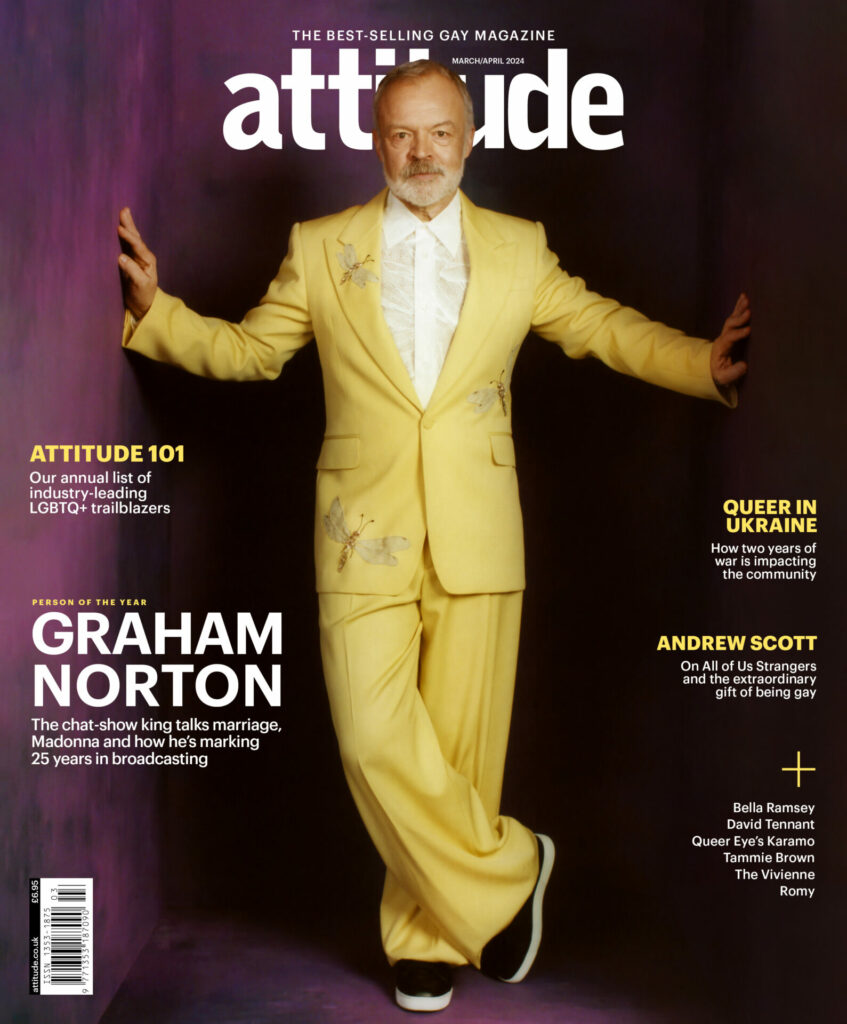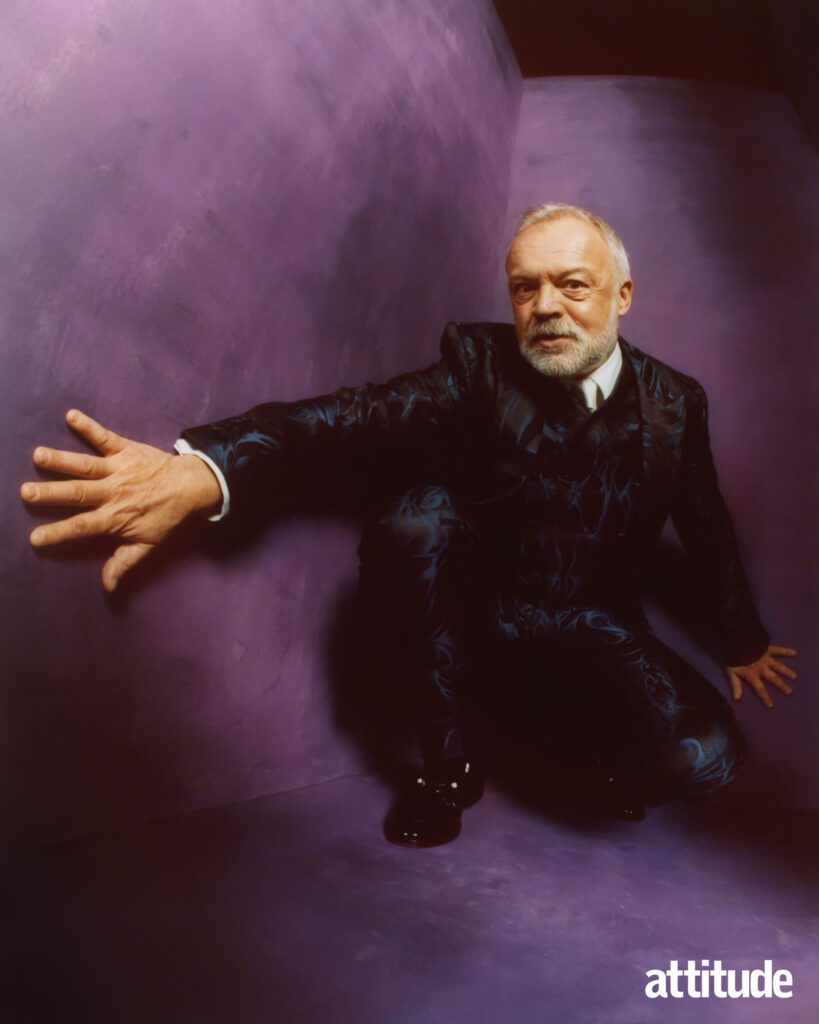Graham Norton named Attitude 101 Person of the Year – read his powerful acceptance speech in full
Graham Norton - Attitude’s Person of the Year – was speaking at our event in London to celebrate Attitude 101, empowered by Bentley
By Dale Fox & Jamie Tabberer

Graham Norton has been named Attitude’s Person of the Year, and leader of this year’s Attitude 101, empowered by Bentley.
Speaking at an event at London’s Rosewood Hotel on Friday 16 February, the Drag Race UK host referenced his long-standing relationship with Attitude, which celebrates its 30th anniversary this year.
Norton interviewed late Boyzone star Stephen Gately for Attitude in 2000, after the singer’s sexuality was “smoked out”.
“Where is the progress?” – Graham Norton
Taking to the stage at the event, The Graham Norton Show host said: “I was thinking about my own relationship with Attitude Magazine, and it began in the late ’90s. I interviewed for the magazine Stephen Gately, from Boyzone, about coming out. He had sort of been smoked out, been forced out, and he was really traumatised.
“It was a long time ago, 25 years ago, and you think, ‘Well, the world has changed. The world has moved on. We’ve come so far. And then in the last 12 months, we saw the way the press dealt with Phillip Schofield, the way they dealt with Huw Edwards, and you kind of begin to think, have we moved the needle at all? Where is the progress?”

The Eurovision pundit continued: “But it’s not all doom and gloom, because we are here. This room is here. And it brings us back to the list and why this [101] list is important. Because there are so many stories of hope in this room, so many stories of how things have changed in this room.”
In his Attitude cover interview, out now, Graham also discussed Drag Race UK, saying: “You know, it was interesting when the show started here. I adored the American version, and you didn’t know what it was going to be like here. Can UK queens really come up with all those looks?! But I’ve been so impressed with them.
“In lots of ways, I prefer the UK version. I think it has informed the sorts of queens they’re casting in America. This new season, I think the casting has been influenced by the UK.”

He added he plans to judge on the show indefinitely, he said: “‘Indefinitely’ makes it sound like me and Ru will be skeletons behind the desk! I’m still enjoying it, and they’re still asking me to do it.”
Our list of 101 influential LGBTQ people also includes ITV News journalist Paul Brand, drag queen and environmentalist Miss Toto and The Last of Us star Bella Ramsey.
Read Graham’s full speech below
I want to say Happy Birthday to Attitude – 30 years of Attitude magazine. Congratulations. An amazing achievement, particularly now in that perilous world of magazine publishing, that you’re still on the newsstands and still as popular and relevant, and I guess 30 years, it makes you kind of reflect on the last three decades. And how far we’ve come as a community.
And I was thinking about my own relationship with Attitude Magazine, and it began in the late ’90s. I interviewed for the magazine Stephen Gately, from Boyzone, about coming out. He had sort of been smoked out, being forced out, and he was really traumatised. I was talking to him about that. And it was a long time ago, 25 years ago, and you think, well, you know, the world has changed. The world has moved on. We’ve come so far.
And then in the last 12 months, we saw the way the press dealt with Phillip Schofield, the way they dealt with Huw Edwards, and you kind of begin to think, have we moved the needle at all? Where is the progress?
And you know, you mentioned Drag Race, and I’m on the panel of Drag Race UK, and while Michelle Visage was going on about lumpy padding, my thoughts were on the kids on the show, these young queens on the show, and the moving stories they tell in the workroom. The stories about being rejected by their family, the stories about being bullied at school, the stories about being physically assaulted.
And someone was saying, why haven’t these stories changed? Why are these young queer kids still telling these stories all these decades later? And I remember Dan Savage, he had a great campaign about 2010, the ‘It Gets Better’ campaign. Do you remember that? It was lots of high-profile people talking to queer kids, telling their stories and telling them it gets better. And right now, it can often feel like, Jesus, we’re lying to these kids. We’re just making this shit up.
RuPaul, he has a thing where he says when he watches the news or he gets an email to contribute to some campaign or other, he finds himself going, ‘Didn’t we do this already?’ And as a 60-year-old, I know how that feels. And I guess one of the really frustrating things about all of this is that it’s always framed in terms of culture wars. That’s the word they use, ‘culture wars.’ And that phrase drives me around because it sounds like an esoteric, a rather dry battle of ideas. But of course, as we are so frequently aware, the casualties of those battles of ideas are real people. The consequences are horrific, and the dangerous rhetoric out there, government rhetoric, or cruel jokes that we heard this year, they have actual consequences. It’s awful.
But it’s not all doom and gloom, because we are here. This room is here. And it brings us back to the list and why this list is important. Because there are so many stories of hope in this room, so many stories of how things have changed in this room. And it’s great in this room, but also, I think that list is so important outside of this room. And yes, those lists of names have amazing achievements attached to them, but actually, that’s almost irrelevant. What’s important, I think, is for people to see those names, to see lists of names, and for young people, particularly young people who feel alone, who feel vulnerable, to realise, ‘Oh, hang on, no, there is hope.’
And in bleak, dark days, when they’re trying to roll things back, hope becomes like a sort of superpower. And I feel like there’s an awful lot of hope in this room. And that’s, in the end, the most important thing, that we will not give up hope, that we keep going.
Graham covers issue 357 of Attitude magazine, available to order online here, and alongside 15 years of back issues on the free Attitude app.
